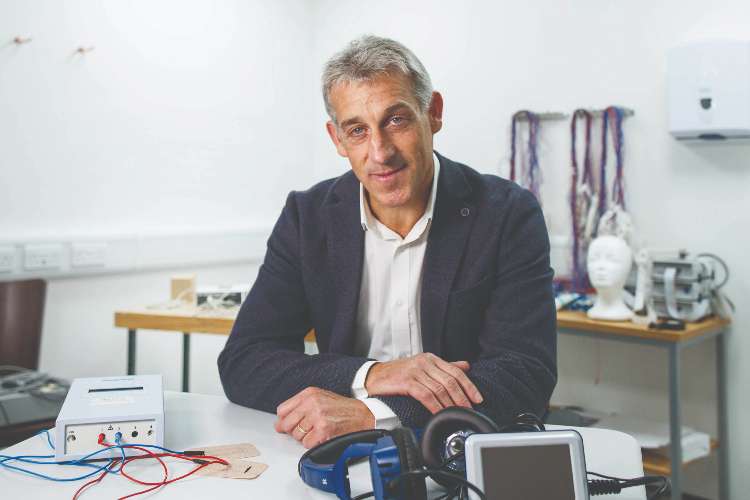
Professor David Wilkinson's research on vestibular stimulation offers a pioneering treatment for conditions including migraine, Parkinson's disease and stroke
Research partners:
- Dr Mohammed Sakel, Neuro-Rehabilitation Service, East Kent Hospitals NHS Foundation Trust
- Dr Mayur Bodani, Neuropsychiatry Service, Kent & Medway NHS and Social Care Partnership Trust
- Scion Neurostim LCC, USA (device manufacturer)
- Parkinson’s UK
Buried deep inside the human skull, the vestibular organs tell our brains which way is up, whether we are moving, and if so which way and how fast. They also contribute to memory, decision-making, mood moderation, the sense of self and body ownership. Diseases of the vestibular organs consequently have devastating effects on a person’s ability to function, which their location can make hard to treat.
Professor David Wilkinson and his research team have developed two non-invasive methods for stimulating the vestibular organs to improve their functioning.
- Caloric vestibular stimulation (CVS) uses a headset to introduce thermal currents into the ear canal which gently warm and cool the vestibular organs. Patients can self-adminster this treatment at home.
- Galvanic vestibular stimulation (GVS) involves using carbon rubber electrodes to deliver undetectable electric currents (around 0.3mA) to the bony structures behind the ears which cover the vestibular nerve.

The treatments have been tested on patients suffering from conditions including stroke, Parkinson’s disease, traumatic brain injury and migraine. In a double-blind randomised control study with 46 Parkinson’s disease patients, half self-administered two active CVS treatments at home each day for eight weeks while the other half did the same with a placebo treatment. Standardised medical assessments found a significant improvement in motor and non-motor symptoms in the treatment group, which was still present five weeks after the end of the trial.
The treatment has been cleared for clinical use against migraine and approval for use against Parkinson’s disease is likely to follow shortly. Studies for Alzheimer’s disease and ADHD are in progress and further research is planned on the treatment of insomnia, depression and anxiety.
More about Professor David Wilkinson
Related coverage:
- University of Kent Magazine: A balancing act: The science of vestibular stimulation
- University of Kent News Centre: Treatment can offer hope for relief of Parkinson’s symptoms
- University of Kent News Centre: Study shows stimulation of the ear can help manage Parkinson’s symptoms
- Global Biotech Insights: Stimulation of the ear can help manage Parkinson’s symptoms
- HCP Live: Caloric vestibular stimulation helps with Parkinson symptoms